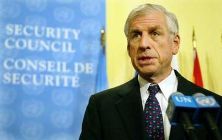US, at UN, urges aid to spur peace in Sudan – Washington Post
By Colum Lynch,
UNITED NATIONS, Nov 15, 2004 (The Washington Post) — The Bush administration is pressing the United Nations to reward Sudan with a major package of international debt relief and reconstruction funds if the Islamic state signs a peace deal ending a brutal, 20-year civil war with the Christian-backed Sudan People’s Liberation Army in southern Sudan by the end of the year.

|
|
US ambassador at the UN, John Danforth. (AFP). |
Sudan has not complied with Security Council demands over three months to disarm, arrest and prosecute Arab militia responsible for the mass murder of black Africans in the eastern province of Darfur, according to U.S. and U.N. officials. The United States has described the campaign as genocide.
The offer of financial aid marks a strategy shift by the United States, which had sought international support for two U.N. resolutions threatening to sanction Sudan if it failed to crack down on the militia, known as the Janjaweed. John C. Danforth, the U.S. ambassador to the United Nations, said that although the threat of sanctions stands, a Security Council meeting in Nairobi, Kenya, on Thursday and Friday will focus more on the “carrot” than the “stick.”
The United States changed course on Sudan after facing stiff opposition to sanctions, including a Chinese threat to block the United States from adopting a U.N. resolution punishing Khartoum over Darfur, according to a senior U.S. official involved in the discussions.
“Are we leaning on a rubber stick? Sure,” Danforth acknowledged in an interview. “It would clearly be extremely difficult to get a resolution that actually imposes sanctions in the Security Council adopted. We’re doing the best we can with that particular tool.”
Danforth is calculating that ending Africa’s longest-running war would lead to peace in Darfur, where Sudanese-backed militia have killed tens of thousands of people and driven more than 1.8 million from their homes. In the meantime, Danforth said, a force of 3,300 African peacekeepers being deployed in Darfur offers the best hope for stemming the violence.
Danforth is pressing the 15-nation council to adopt a resolution in Nairobi that urges international financial agencies, including the World Bank, to devise a plan to grant debt relief, reconstruction aid and development assistance to Sudan if an agreement is signed. One council diplomat said the relief package could amount to more than $100 million.
“We are absolutely not letting up one iota on the pressure with respect to Darfur,” Danforth said. “But it is widely recognized that the future of Darfur is also connected to the overall peace process, which would provide the basis for a political settlement for the entire country, including Darfur.”
The toughest critics of the United States in the council, including Algeria, China and Pakistan, have welcomed the new American approach. “We believe that this is the right path,” said Abdallah Baali, Algeria’s U.N. ambassador. “What we should try to do in Nairobi is, by our presence, to encourage them to come up with an agreement hopefully before the end of the year.”
The diplomatic shift comes as Sudan launched a series of violent raids on camps for displaced Darfurians, part of a campaign to forcibly relocate thousands of distressed civilians. Jan Pronk, the U.N.’s envoy to Sudan, said in a recent interview that armed forces linked to the Sudanese government have been unearthing mass-grave sites to cover up evidence of war crimes.
Pronk has expressed alarm that renewed fighting between Sudanese forces and the rebel Sudan Liberation Army threatens to plunge Darfur into anarchy. He told the council on Nov. 5 that rebel Arab militia are undertaking a recruitment drive in preparation for a new offensive. He also faulted the rebels for stepping up attacks in a bid to claim more territory.
The violence in Darfur began in February 2003, when the rebel Sudan Liberation Army and the Justice and Equality Movement took up arms against the government, citing discrimination against the region’s black tribes. The Sudanese government responded by recruiting, equipping and training Arab militias and sponsoring reprisal raids against the rebels and their supporters.
Last week, Sudan agreed in talks in Abuja, Nigeria, to halt military flights over Darfur and to increase access for humanitarian relief workers. But hours later, it launched a fresh raid on a camp for displaced civilians, beating residents and burning their shelters.
Critics voiced concern that Sudan’s government may be holding out the prospect of a peace deal as a way to distract international attention from atrocities in Darfur. John Prendergast, a Washington-based expert on Sudan at the International Crisis Group, said U.S. policymakers failed to expend sufficient political capital to halt the violence in Darfur a year ago because they feared it would undercut their efforts to promote peace between Khartoum and the country’s Christian-backed rebels.
“This is an eerie repetition of the mistakes that were made late last year, when President Bush sent Danforth to Khartoum as special envoy to offer [Sudanese President Omar Hassan] Bashir the carrot of coming to the State of the Union address if he would only sign on the dotted line,” he said. “If we take our eye off a deteriorating situation in Darfur, we will be reinforcing this same policy mistake of thinking that we can incentivize the path to peace. That is exactly the wrong message to send to Khartoum.”
